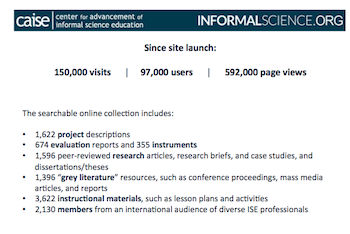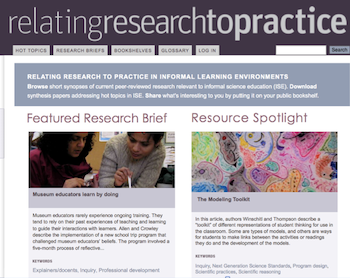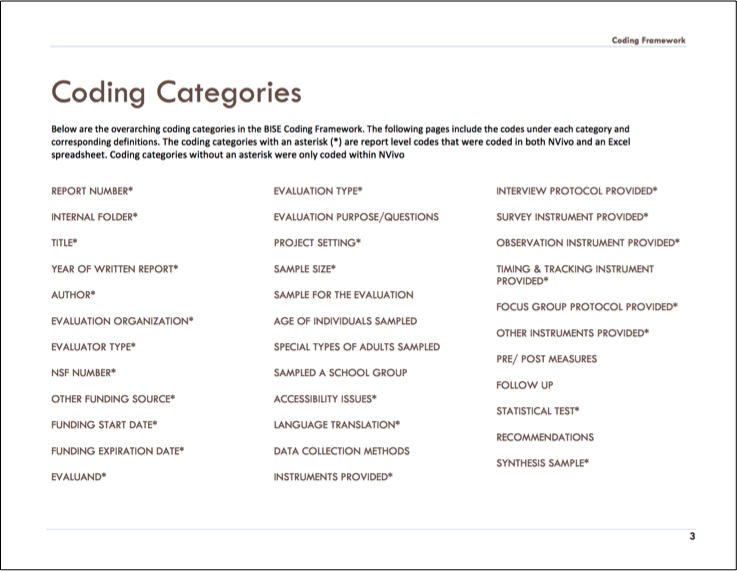Online Infrastructure for the Informal Science Education Field
At the 2014 Association of Science-Technology Centers annual conference, staff from several online infrastructure-related projects came together to discuss existing online resources for informal science education (ISE) professionals, and hear from conference attendees what kinds of online resources would be most useful for them in the future. The full presentation is available on InformalScience.org.
Existing Resources for ISE Professionals
InformalScience.org: InformalScience.org, which was redesigned and re-launched by the Center for Advancement of Informal Science Education (CAISE) in 2013, is a single point of access to a variety of resources that can be useful to designers of informal learning experiences and settings, learning researchers, evaluators, and any other professional doing work to support science learning outside of classroom settings. InformalScience.org is a place to go to access the Informal Commons, which is a searchable repository of 9,000+ resources including project descriptions, evaluation reports and instruments, research articles and other resources, and instructional materials.

Statistics from InformalScience.org since launch in May 2013.
InformalScience.org is also the place that ISE professionals can go to connect with others by finding collaborators in the member directory, getting news and updates from the Perspectives blog, and learning about upcoming funding and professional development opportunities on the calendar.
As CAISE continues to plan and make improvements and updates to InformalScience.org, we are interested in knowing which kinds of resources are particularly useful for site users, and trying to understand how different kinds of users are making use of the current site resources.
Relating Research to Practice (RR2P): Relating Research to Practice provides short synopses of peer-reviewed research relevant to formal and informal science education. Users can browse or search based on keyword, or look at curated collections of papers around "hot topics" in science education (such as Communicating Climate Change or Engaging Learners with Scientific Practices). If RR2P users would like to read the full text version of an article after seeing its RR2P Research Brief, they may be able to find it by logging in to InformalScience.org and searching the EBSCO Education Research Complete database.

The Relating Research to Practice home page.
RR2P is currently exploring a "connected collections" resource, which will provide an overview of a specific topic in ISE; abstracts of 4-5 related briefs with an explanation of how they are connected; the key questions, tensions, and ideas; and how to use the collection in staff reflective discussions or professional development. Right now, RR2P project leaders are interested in knowing if professional reflection is something that's of interest to ISE practitioners, and how interested such professionals are in accessing research results.
Building Informal Science Education (BISE): The BISE project has read, analyzed, and coded 500+ evaluation reports posted to InformalScience.org. This data can help ISE professionals understand how evaluations are carried out on different types of ISE projects, inform the development of an evaluation, and learn from similar types of projects.
To get started, BISE project staff first developed a codebook, which was then applied to the evaluation reports. The full coded database of reports is available through an Nvivo database; BISE project staff have also put the database into an Excel file that has been distributed at professional conference (such as the recent Visitor Studies Association (VSA) conference).

Categories from the BISE codebook.
BISE also asked authors with particular expertise to create synthesis papers on different topics using the database; those papers are available on the VSA website and are also being summarized in an ongoing blog series in Perspectives. BISE is interested in finding out if this work is useful for different kinds of ISE professionals (i.e., evaluators, researchers, and practitioners), as well as if synthesis papers and summaries are useful to the community writ large, and if so, which topics would be of most use.
CitizenScience.org: CitizenScience.org has been posting project descriptions and other resources useful to citizen science professionals for several years (and contributing to the Informal Commons since its launch).

Recently, project leaders at the Cornell Lab of Ornithology began the process of redesigning and relaunching the site to provide capacity for new, but rapidly growing, Citizen Science Association (CSA). The new site will provide a resource sharing platform for a hugely diverse field.
Through the new site, users will be able to better characterize and navigate the wide variety of projects in the citizen science landscape. The user base might also expand to include not only designers and leaders of citizen science projects, but the huge numbers of volunteer contributors that are helping to grow the field.
What Do ISE Professionals Need and Want?
After hearing from project staff, we asked the audience four questions about their use of online infrastructure:
- What resources are needed?
- How do you find out about existing resources?
- What are ways we can make resources more accessible and useful?
- What are you currently using?
Thoughts from the audience included:
- Journal access—although research briefs are still very important
- Curated resources to help establish a "culture of learning" in institutions
- Similarly, themed collections that can be widely shared—maybe a weekly discussion using a hashtag
- Need curriculum and activities
- Better connections to multiple sites, such as a single log-in (through a unique ID or even something like a Google account)
- Wikipedia can be a good place to look for inspiration for new projects and work—just make sure to look elsewhere for science content, such as through university-run websites or in the local K-12 school system
- Visit new conferences and talk with people outside of the field to find out about new things
- From a marketing/communications standpoint—what about a workshop or tutorial for people who are writing grants, but who aren't necessarily deeply embedded in the work (for example, institutional grant writers)?
- Guidelines for even using the right vocabulary—resources to help people use the right search terms.
We hope that these thoughts are helpful for current (and potential!) designers of informal science education online infrastructure projects. Do you have a suggestion? Tell us in the comments below.